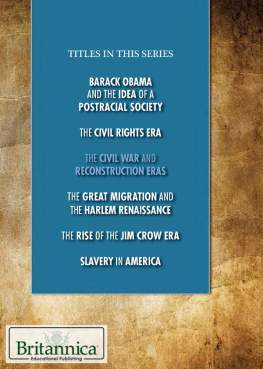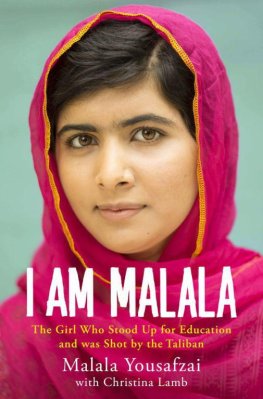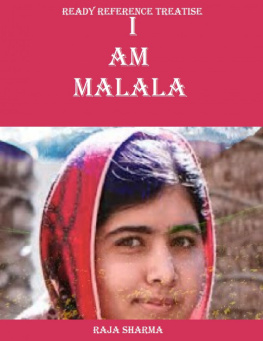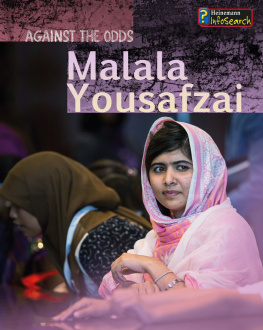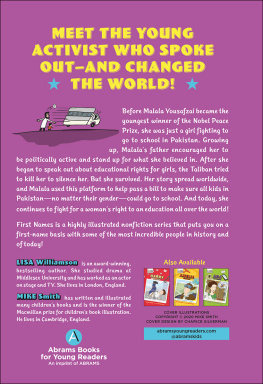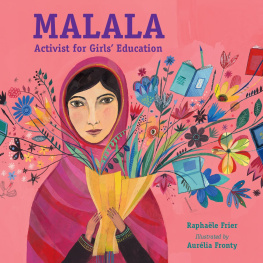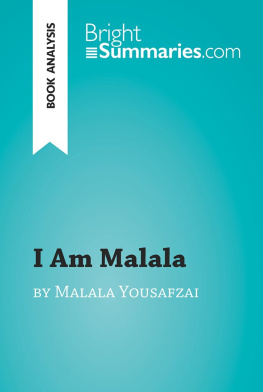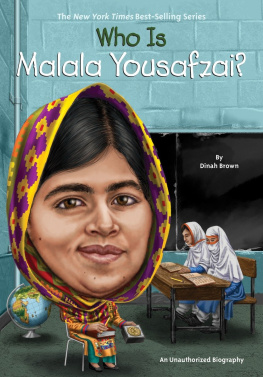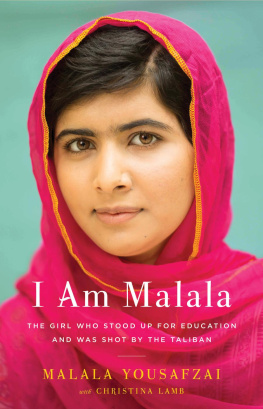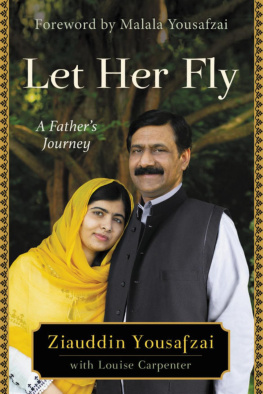Tracey Baptiste - Malala Yousafzai: Activist
Here you can read online Tracey Baptiste - Malala Yousafzai: Activist full text of the book (entire story) in english for free. Download pdf and epub, get meaning, cover and reviews about this ebook. year: 2016, publisher: Infobase Publishing, genre: Science fiction. Description of the work, (preface) as well as reviews are available. Best literature library LitArk.com created for fans of good reading and offers a wide selection of genres:
Romance novel
Science fiction
Adventure
Detective
Science
History
Home and family
Prose
Art
Politics
Computer
Non-fiction
Religion
Business
Children
Humor
Choose a favorite category and find really read worthwhile books. Enjoy immersion in the world of imagination, feel the emotions of the characters or learn something new for yourself, make an fascinating discovery.
- Book:Malala Yousafzai: Activist
- Author:
- Publisher:Infobase Publishing
- Genre:
- Year:2016
- Rating:5 / 5
- Favourites:Add to favourites
- Your mark:
- 100
- 1
- 2
- 3
- 4
- 5
Malala Yousafzai: Activist: summary, description and annotation
We offer to read an annotation, description, summary or preface (depends on what the author of the book "Malala Yousafzai: Activist" wrote himself). If you haven't found the necessary information about the book — write in the comments, we will try to find it.
In 2009, during a period when the Taliban held sway over Pakistans Swat district and began shutting down girls schools, Malala Yousafzai, the school-age daughter of a local poet and education activist, began writing about her experiences in a BB
Malala Yousafzai: Activist — read online for free the complete book (whole text) full work
Below is the text of the book, divided by pages. System saving the place of the last page read, allows you to conveniently read the book "Malala Yousafzai: Activist" online for free, without having to search again every time where you left off. Put a bookmark, and you can go to the page where you finished reading at any time.
Font size:
Interval:
Bookmark:
Copyright 2016 by Infobase
All rights reserved. No part of this publication may be reproduced or utilized in any form or by any means, electronic or mechanical, including photocopying, recording, or by any information storage or retrieval systems, without permission in writing from the publisher. For more information, contact:
Chelsea House
An imprint of Infobase
132 West 31st Street
New York NY 10001
ISBN 978-1-4381-6678-0
You can find Chelsea House on the World Wide Web
at http://www.infobaselearning.com
On the afternoon of October 9, 2012, Malala Yousafzai was doing what millions of other 15-year-old girls all over the world were doing: she was waiting for the school bus to pick her up and take her home. The Khushal School, nestled in the Swat Valley of Pakistan, had been founded by her father Ziauddin Yousafzai before she was born. Since the Taliban took control of the area, and declared that girls should not be educated, the school had no sign. There is just a white wall with a brass door, behind which is a set of stairs leading to an upper courtyard with doors to different classrooms. As Malala waited at the top of those steps after a full morning of exams, she was looking forward to the short five-minute bus ride that would take her home. On that bus she could talk and gossip with the other girls and with their bus driver, Usman Ali, who the girls called Bhai Jan, Brother.
Malala did not always take the bus. The school was close enough for her to walk. But over the course of the previous year, the family had become increasingly concerned about threats on her life and that of her father. It didnt stop them from speaking out against the Taliban or in favor of girls education, but it did make Malala and her mother extra cautious. Malalas mother, Tor Pekai, insisted that she start taking the bus home. Malala herself always checked the doors and windows to make sure that they were secure at night, while her father seemed to remain unconcerned about an attack. He felt that they might come after him, he thought the Taliban would never target a child. After his friend Zahid Khan, who was also a campaigner against the Taliban, had been shot in the face in August 2012 on his way to prayers, friends and family members kept warning the Yousafzai family that they could be next. It was after this incident that Tor Pekai insisted that Malala come home on the bus with the other children.
The bus always stopped before the street that Malala and her best friend, Moniba, lived on. Then they walked past a gate and up some stairs to their homes. Malala kept assuring her friend that nothing would ever happen to her, but at the same time, she worried about an attack. She believed that those stairs would be the scene of an attack against her and imagined what she would do and say if she was confronted by an attacker there. She would try to talk to her attacker, she would try to make them understand. She thought she would have time. And she was not worried about the school bus.
That afternoon in October, the school bus, which was really a Toyota van with three long benches nailed into the back, waited as twenty girls and three teachers came down the steps of the school. After they boarded, the bus went its usual route. The street was filled with people and brightly-colored, diesel-spewing rickshaws. It passed a hair transplant institute and drove past a military checkpoint. The girls were chattering, telling jokes, and talking about the exams they had that morning. They were not far past the checkpoint when someone stopped the bus by stepping into the street.
Is this the Khushal School bus? he asked.
The driver replied that it was, though it was obvious, since the name of the school was painted at the side of the bus.
I need information about some children, the man said.
The bus driver told the man to go to the schools office; at the same time, another man looked in from the back of the bus. The girls thought that it was a journalist looking for another interview. Over the last year, Malala had had many interviews with journalists, though none of them had ever stopped her on the street. The man was young. He got up on the tailboard at the back of the bus and leaned over the girls.
Who is Malala? he asked.
Although no one answered, several of the girls looked in Malalas direction. The young man, who was later revealed to be a 23-year-old Chemistry student, lifted a black Colt .45 pistol and, with shaking hands, he aimed it at Malalas head. Malala squeezed her best friends hand. Then the man fired three quick shots.
Malala was not the only one who had been hit that day. As she slumped over, dripping blood onto her best friend, the other two shots hit two other students on the bus. One was shot through the hand, a third bullet grazed another girls shoulder.
The bus driver took off at once to the nearest hospital.
The global community was immediately horrified by the shooting. A top military officer in Pakistan condemned the attack and visited the hospital to check on Malala. White House Press Secretary Jay Carney called the shooting barbaric and cowardly. Pakistani women held a protest for the right of girls to have an education. Their signs read You are our hope and The Taliban is afraid of an unarmed girl. While people questioned whether the attack would be a turning point for peace in the region, the Taliban doubled down on their actions. Ehsanullah Ehsan, chief spokesperson for the Pakistani Taliban, said that Malala was the symbol of infidels and obscenity and stated that the Taliban would target her again, given the opportunity.
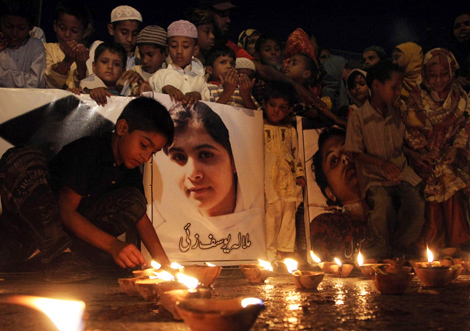
October 12, 2012. People lit candles to pray for the recovery of Malala in Karachi, Pakistan.
Source: Newscom.
Malala was airlifted to a military hospital and remained in critical condition. Late in the night an operation was performed to remove part of her skull because her brain had begun to swell. They also removed the bullet that was lodged in her shoulder and placed her in a medical coma. As offers to help poured in from around the globe, Malala was taken to yet another hospital in Rawalpindi. But it soon became apparent that she could not be properly cared for where she was. Her doctors and her family made the decision to take her to Birmingham, England for treatment. However, getting her there brought problems of its own. There were offers by the British military to transport her, but the Pakistani government feared how it would look if they got help from a Western country. Eventually the United Arab Emirates offered an air ambulance, which had an on-board hospital. A passport had already been secured for Malala, but her mother and brothers had none; her father refused to leave the rest of the family by themselves in the country. Eventually, after much arguing, Malala made the trip alone. When she woke on October 16, a week after the shooting, she had no idea where she was or the kind of impact her story had made on the world.
Malala has since recovered and become a beacon for the cause of girls education around the world. The protests around Pakistan led to more than two million people signing the Right to Education campaign. This petition led to the ratification of Pakistans first Right to Education bill. Pakistani officials set a reward of 10 million rupees ($105,000 USD) for information leading to the arrest of her attackers. Gordon Brown, former British prime minister, launched a petition on behalf of Malala under the slogan I am Malala. The aim of the petition was to demand that no child was left out of school by 2015, and called for laws preventing discrimination against girls in every country. In the years since the attack, she has been awarded more than forty awards and honors, including Pakistans National Youth Peace Prize, President Clintons Global Citizen Award, the Freedom of Thought Prize from European Parliament, and was a joint recipient of the Nobel Peace Prize in 2014.
Font size:
Interval:
Bookmark:
Similar books «Malala Yousafzai: Activist»
Look at similar books to Malala Yousafzai: Activist. We have selected literature similar in name and meaning in the hope of providing readers with more options to find new, interesting, not yet read works.
Discussion, reviews of the book Malala Yousafzai: Activist and just readers' own opinions. Leave your comments, write what you think about the work, its meaning or the main characters. Specify what exactly you liked and what you didn't like, and why you think so.


